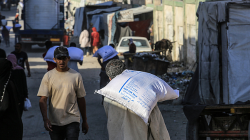UN Reports Gaza Humanitarian Crisis at Its Worst Since War Began
UN warns Gaza faces worst humanitarian crisis since October 2023 escalation amid airstrikes and widespread suffering.

The humanitarian crisis in Gaza has reached unprecedented levels of severity, according to the United Nations, following months of relentless airstrikes, widespread malnutrition, mass displacement, and a collapse of public order. The UN Office for the Coordination of Humanitarian Affairs (OCHA) described the current situation as the worst since the onset of hostilities in October 2023, with conditions steadily deteriorating as the conflict drags on.
On Thursday, only five truckloads of desperately needed humanitarian aid managed to enter the Gaza Strip after a four-day halt, highlighting the formidable challenges facing relief operations. Another 60 trucks were forced to turn back at the Kerem Shalom/Karem Abu Salem crossing due to ongoing hostilities and rampant insecurity in the vicinity. The area surrounding the main checkpoint has seen increased activity by armed groups, making it nearly impossible to guarantee the safe passage of aid convoys.
The scarce medical supplies that did reach Gaza were intended for a field hospital in Deir Al-Balah, yet most of them were reportedly looted soon after arrival. The breakdown in law and order has made it virtually impossible to ensure humanitarian assistance reaches those in need, further compounding the suffering of civilians.
After nearly 80 days of a total blockade implemented by Israeli authorities, OCHA warned that the limited volume of aid entering Gaza is grossly inadequate for the 2.1 million people trapped in the conflict zone. Aid organizations continue to battle severe restrictions not only on the quantity but also the types of relief permitted into the region, hampering efforts to address basic survival needs such as food, water, medicine, and shelter.
The only partially functioning hospital in northern Gaza, Al Awda, was forced to evacuate recently under direct threat from repeated airstrikes, leaving residents with virtually no access to healthcare. Simultaneously, strikes in Deir al-Balah, along with the heavily populated Al Bureij and An Nuseirat camps, have resulted in significant civilian casualties, including children and journalists' families.
Aid agencies and their staff have been caught in the crossfire. The international charity IHH, responsible for running community kitchens and nutrition centers, reported five staff killed and two injured within just 48 hours. OCHA stressed that all parties must respect the neutrality and security of humanitarian workers and facilities.
Displacement across Gaza is intensifying at an alarming pace, with nearly 200,000 people newly displaced over the past two weeks alone. A fresh set of displacement orders issued by Israeli authorities now covers roughly 30 percent of Gaza’s territory, further uprooting populations already traumatized by previous evacuations. Field partners report that much of the movement observed is driven not by official orders, but by desperate attempts to find food and basic necessities.
Efforts to provide emergency shelter continue; recently, 45 families in Gaza City received emergency shelter kits as part of an innovative pilot project. Yet, these measures remain a drop in the ocean compared to the overwhelming scale of need. As public order collapses, looting incidents are becoming more frequent, with vital medical equipment and nutritional supplements being stolen from aid warehouses—supplies originally destined for malnourished children.
OCHA is calling for urgent accountability for those perpetrating criminal looting and an immediate increase in the volume and safe distribution of life-saving aid. The agency emphasized that the only way to prevent further chaos and deprivation is to allow far greater quantities of humanitarian and commercial goods into Gaza through multiple entry points.
The UN reiterated that, as the occupying power, Israel holds the primary responsibility for restoring order and ensuring the safety of civilians in Gaza. Among its recommendations is permitting civilian police forces to operate under recognized legal standards to restore some semblance of stability. The agency again called for a complete lifting of the blockade and action to address the underlying causes of the humanitarian disaster enveloping the enclave.
Beyond Gaza, the situation in the West Bank remains volatile. Reports indicate a surge in Israeli settler violence, resulting in over 220 Palestinian injuries—the highest rate in two decades. Entire communities, such as Maghayer ad Deir, have been forcibly displaced following the expansion of settlement outposts near their homes. Stringent movement restrictions imposed across Salfit governorate have further disrupted access to essential services for almost 90,000 residents, forcing families to endure long detours and inflated transportation costs, compounding their hardships.
OCHA concluded by reiterating the urgent imperative to protect civilians, ensure the safe delivery of humanitarian aid, and guarantee unimpeded access to critical services such as healthcare, education, and livelihoods. As the crisis deepens both in Gaza and the West Bank, the call for immediate and decisive international action grows increasingly urgent.




